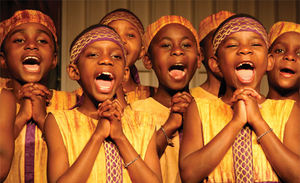Young Peoples guide to the SATB Choir
In any choir, there are four voice parts: soprano, alto, tenor, and bass (voice). Each voice part sings in a different vocal range, and each one has a very different personality. Sometimes these four are divided into first and second within each part, prompting endless jokes about first and second basses.
There are also various other parts such as baritone, countertenor, contralto, mezzo soprano, etc. These are mostly used by people who are either soloists, belong to some excessively hot shot classical a cappella group (this applies especially to countertenors), or are trying to make excuses for not really fitting into any of the regular voice parts. We will ignore them for now.
You may ask, "Why should singing different notes make people act differently?" and indeed this is a mysterious question and has not been adequately studied, especially since scientists who study musicians tend to be musicians themselves and have all the peculiar complexes that go with being tenors, French horn players, timpanists, or whatever. This is beside the point, however; the fact remains that the four voice parts can be easily distinguished.
THE SOPRANOS[edit | edit source]
The Sopranos are the ones who sing the highest, and, because of this, they think they rule the world. They have longer hair, fancier jewellery, and swishier skirts than anyone else. They consider themselves insulted if they are not allowed to go at least to a high F in every movement of any given piece. When they reach the high notes, they hold them for at least half again as long as the composer and/or conductor requires and then complain that their throats are killing them and that both the composer and conductor are sadists. Sopranos have varied attitudes toward the other sections of the chorus, though they consider all of them inferior. Altos are to sopranos rather like second violins to first violins - nice to harmonise with but not really necessary. All sopranos have a secret feeling that the altos could drop out and the piece would sound essentially the same, and they don't understand why anybody would sing in that range in the first place - it's so boring. Tenors, on the other hand, can be very nice to have around, sopranos like to sing duets with tenors because all the tenors are doing is working very hard to sing in a low-to-medium soprano range, while the sopranos are up there in their range (the stratosphere) showing off effortlessly. To sopranos, basses are the scum of the earth. They sing too damn loudly, are useless to tune to because they're down in that low, low range, and there has to be something wrong with anyone who sings in the F clef.
THE ALTOS[edit | edit source]
The Altos are the salt of the earth - in their opinion, at least. They are easily the most credible and gentle voice part. Altos are unassuming people who would wear jeans to concerts if they were allowed to. Altos are in a unique position in the chorus in that they are unable to complain about having to sing either very high or very low, and they know that all the other sections think their parts are pitifully easy. But the altos know otherwise. They know that while the sopranos are screeching away on a high A, they are being forced to sing elaborate passages full of sharps and flats and tricks of rhythm, and nobody is noticing because the sopranos are singing too loudly (and the basses usually are, too).
Altos get a deep, secret pleasure out of conspiring together to tune the sopranos flat. Altos have an innate distrust of tenors, because the tenors sing in almost the same range and think they sound better. Altos like the basses and enjoy singing duets with them - the basses just sound like a rumble anyway, and it's the only time the altos can really be heard. Altos' other complaint is that there are always too many of them and so they never get to sing really loudly.
In some choirs the alto part is sung by countertenors. These are mostly wannabe castrati who don't have the capacity to reach such heights, or accept that they are homosexual.
THE TENORS[edit | edit source]
The Tenor section in a choir usually comprises of gay men and baritones who have some sort of musical talent, or at least resonance cavities where their brains ought to be. That's all there is to it. For one thing, there are never enough of them, and choir directors would rather sell their souls than let a half decent tenor quit, and sometimes make up the numbers with butch contraltos at half price since they have the same vocal range and sound like men anyway. And then, for some reason, the few tenors there are always really good - it's one of those annoying facts of life. So it's no wonder that tenors always get swollen heads. The one thing that can make tenors insecure is the accusation (usually by the basses) that anyone singing that high couldn't possibly be a real man. Ironically, it is normally the case that, despite their comparative lack of facial hair, they are the most manly although this is simply because they only like the company of other homosexual men. In their usual perverse fashion, the tenors never acknowledge this but just complain louder about the composer being a sadist and making them sing so damn high. Tenors have a love-hate relationship with the conductor, too, because the conductor is always telling them to sing louder because there are so few of them. No conductor in recorded history has ever asked for less tenor in a forte passage.
Tenors feel threatened in some way by all the other sections - the sopranos because they can hit those incredibly high notes; the altos because they have no trouble singing the notes the tenors kill themselves for; and the basses because, although they can't sing anything above an E, they sing it loudly enough to drown out the tenors. Of course, the tenors would rather die than admit any of this.
It is a little-known fact that tenors move their eyebrows more than anyone else while singing. Tenors may not be able to count as well as basses, but can perform complicated feats like counting rests visibly, audibly and wrongly all at once.
When tenors are split into two groups, the truth is revealed as to why some of them complain about high notes; Tenor 1 probably consists of genuine handbag carrying tenors. However Tenor 2 are simply bog standard baritones just like bass 1.
THE BASSES[edit | edit source]
The manliest of all parts. The Basses are also normally simply baritones that sing lower than everyone else, often by as much as a half tone. This basically explains everything. They are stolid, dependable people and have more facial hair than anybody else. The basses feel perpetually unappreciated, but they have a deep conviction that they are actually the most important part (a view endorsed by musicologists but certainly not by sopranos or tenors), despite the fact that they have the most boring part and often sing the same note (or in endless fifths) for an entire page. They compensate for this by singing as loudly as they can get away with. The basses are sometimes split into seperate parts, bass 1 and 2, this is done to give the bass 2 yet another thing to feel great about, as they are proved to be even more manly than every other man in the world, and probably are legit basses which often leads to jokes about how those bass 1s (baritones) failed to fake tenor.
Basses are the only section that can regularly complain about how low their part is, and they make horrible faces when trying to hit very low notes. Basses are charitable people, but their charity does not extend so far as tenors, whom they consider effeminite poseurs. Basses hate tuning with the tenors more than almost anything else. Basses like altos - except when they have duets and the altos get the good part. As for the sopranos, they are simply in an alternate universe that the basses don't understand at all. They can't imagine why anybody would ever want to sing that high and sound that bad when they make mistakes. When a bass makes a mistake, the other three parts will cover him, and he can continue on his merry way, knowing that sometime, somehow, he will end up at the root of the chord.
Basses will often have the most fun during choir rehersals, this is because they don't really need to concentrate because their part is so damn easy, with all those long, long notes, and not even any words to sing; just da or la. This also means that that when the conductor has to spend hours going through all the other parts individually the basses can just sit there and joke about how the tenors aren't real men, the altos are really men pretending to be girls and how the sopranos are just stupid.
Basses are better at counting that tenors, because they can count up as far as twenty-one, though this does involve taking all their clothes off.

